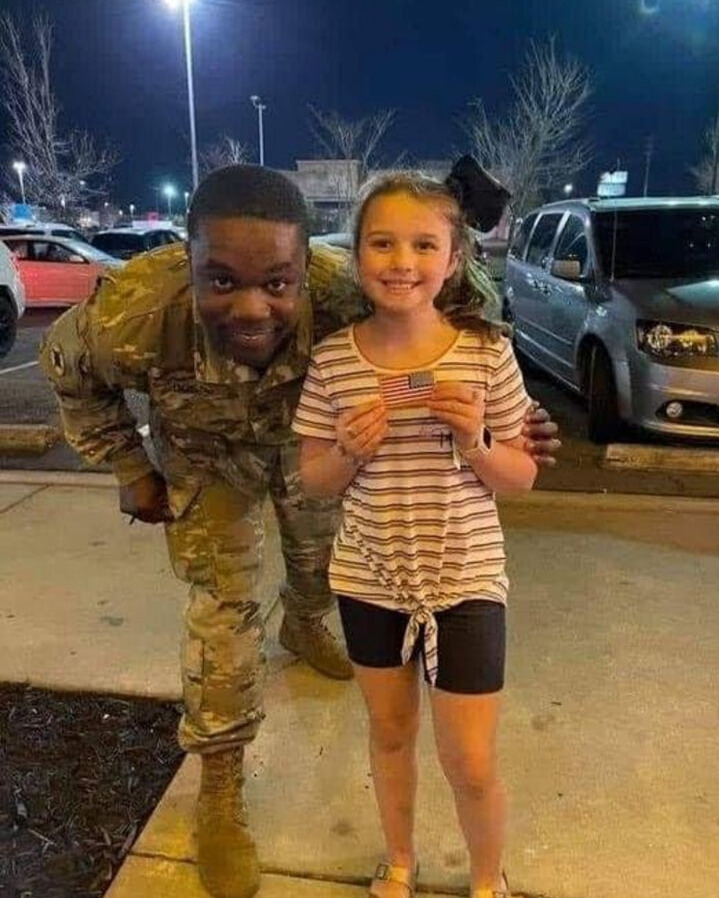That evening in Hattiesburg, we were just a regular family waiting outside a restaurant, passing the time until our table was ready. It had been a long, tiring day. The kids were growing restless, shifting on their feet, fidgeting with their hands, and asking the classic question every parent knows all too well—“How much longer?” Just when I was about to suggest a little walk to distract them, Macie, our youngest, stopped mid-fidget and locked eyes on something across the parking lot.

She saw him first—an Army soldier walking alone toward the restaurant’s entrance. Without skipping a beat, in her soft and sweet voice that could melt even the most hardened heart, she quietly said, “Thank you for your service.” It was simple, sincere, and completely unprompted.
But the soldier didn’t hear her. He was already a few steps past us, heading inside, likely just looking forward to a peaceful meal after what might’ve been a long day. He never turned around, didn’t even glance our way. There was no acknowledgment, not because he was rude or dismissive—he just didn’t hear her.
I looked down at Macie. She looked up at me, her eyes a little unsure, disappointment flickering across her face. She’s naturally shy, especially around people she doesn’t know, and I could tell the moment was already starting to slip away. I knew that if the soldier came back out, she probably wouldn’t have the courage to say it again. But I also knew how much it meant to her to try.
A few minutes passed. We chatted about the menu, tried to keep the kids entertained, and honestly, I figured that was that. A good effort, a sweet moment between a little girl and her good intentions.
But then I saw the soldier walking back toward the entrance, his takeout bag in hand. I gently stepped forward and, hoping not to startle him, said, “Sir, I don’t think you heard her earlier, but my daughter said thank you for your service.”
He paused. Turned to look at us. And then he smiled—a warm, genuine smile that softened his whole demeanor.
He nodded and replied, “Thank you. I really appreciate that.” It was a small exchange, maybe just a few seconds long, but it felt meaningful. We all thought that would be the end of it. He continued toward his car, climbed in, and shut the door.
But then something unexpected happened.
The car door opened again. He stepped out.
He walked straight over to where Macie stood next to me, and without any fanfare or dramatic gestures, he knelt slightly to her level and looked her in the eyes.
“Can you hold on to something for me?” he asked gently.
Macie’s eyes grew wide with curiosity. She nodded. He raised his right arm and pointed to the American flag patch stitched to his uniform.
“This,” he said. “I want you to have it.”
With deliberate care, he peeled the patch from his sleeve and placed it gently into her tiny hands.
My breath caught. I felt a chill ripple across my arms.
In that quiet moment—outside a regular restaurant, on an otherwise unremarkable evening—a soldier who owed us absolutely nothing chose to give my daughter something she would never forget. Not just a patch, but a memory. A lesson. A feeling of being seen, heard, and appreciated.
Macie stared down at the patch like it was made of gold. Her fingers closed around it carefully, reverently, as if it might slip away if she wasn’t careful. To her, that little piece of cloth wasn’t just a souvenir. It was a symbol of something far bigger.
As a parent, you try your best to teach your kids the right values—respect, kindness, gratitude. You remind them to say “thank you,” to be thoughtful, to look beyond themselves. But lessons are often just words until something gives them weight.
That night, in one simple, profound gesture, a soldier gave Macie a lesson in gratitude that no lecture or storybook ever could. He showed her what honor looks like—not just in wearing a uniform, but in taking the time to recognize a small act of kindness and returning it tenfold.
I’ve always told my kids that when they see someone in uniform—whether military, police, fire, or emergency services—they should stop and say thank you. It’s a small thing, but it matters. It matters because behind every uniform is a person who’s made sacrifices, who’s shown up on hard days, who’s been willing to put others first.
Macie didn’t say thank you for attention or praise. She said it because she meant it. And that soldier didn’t respond for show. He responded because he saw something pure in her gesture and wanted to honor it.
Later that night, after dinner, Macie held onto that flag patch like it was a treasure. She kept asking questions about what it meant, who the soldier might be, what kind of things he might have done or seen. Her curiosity was endless, but more than that, her pride was unmistakable.
In the days since, that patch has stayed close to her. It’s been tucked under her pillow, brought to school for show-and-tell, and handled with the utmost care. It’s not just a patch. It’s a reminder that kindness is noticed. That small voices can be powerful. And that when you speak with sincerity, someone might just listen.
That soldier may never know the full impact of what he did, but I will never forget it.
And I know Macie won’t either.





